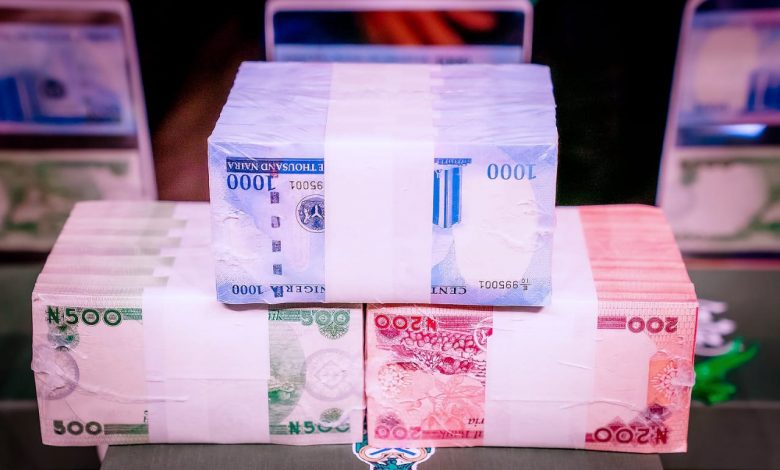Nigeria’s Naira Falls to Record Low in Parallel Market

Nigeria’s Naira Falls to Record Low in Parallel Market
Drop fueled by increased demand for dollars
“While we’re still fine-tuning our view given the changed meeting schedule, this could see anything from 300 basis points to 500 basis points of front-loaded tightening at the February meeting,” said Razia Khan, chief economist for Africa and the Middle East at Standard Chartered Bank.
“In all we expect 550 basis points of tightening in 2024, followed by easing from September once conditions allow,” she said.
Since taking office, Cardoso has hinted at a return to orthodox policies, a departure from his predecessor Godwin Emefiele, whose unorthodox approach to policy unnerved investors and led to a rapid slowdown in capital inflows into the West African nation.
President Bola Tinubu suspended Emefiele a few weeks after he took office and the former central bank chief has since been arrested and charged with crimes including fraud. He has denied wrongdoing and the trial is ongoing.
Under its new leadership, the central bank has let the naira trade in increasingly wider bands in the official market and also signaled monetary tightening by selling its short-dated OMO, or open market operation notes, at increasingly higher interest rates.
Still, tightening monetary policy would not be enough to curb inflation as long as Africa’s largest crude producer continues to deal with foreign-exchange shortages that has caused a rapid depreciation in the local currency, said Victor Aluyi, senior vice president and head investments at Sankore Investments.
“The markets are looking for a robust plan from a policy perspective that would deal with the FX challenge,” Aluyi said. “The importance of unambiguity around monetary policy and forward guidance cannot be over-emphasized.”
— With assistance from Emele Onu
Naira Weakens Again as Nigeria Struggles With Dollar Shortage
- Nigeria settles $2 billion in dollar backlog but demand weighs
- ‘Many businesses are looking for the dollar and can’t find it’
Dealers exchanged naira on the official market at levels as low as 1,299.50 per dollar.
Nigeria’s naira slipped to fresh lows in intraday trade this week, despite efforts by the central bank to clear a backlog of orders for US dollars that’s been undermining the currency for months.
Dealers exchanged naira on the official market at levels as low as 1,299.50 per dollar, which improved slightly to 1,261 naira by Thursday as liquidity improved, according to investment bank Chapel Hill Denham in Lagos.
On the unofficial market it slumped to a new low of 1,363 against the dollar, compared with 1,350 the previous day, said Abubakar Mohammed, chief executive for Forward Marketing Bureau de Change Ltd., which compiles the data.
‘Can’t Find’
“Many businesses are looking for the dollar and can’t find it; also individuals that have naira want to change to dollars to preserve the value,” he said.
Many Nigerians rely on the unofficial market for dollars because of limited access to the official central bank window, where there is a backlog of outstanding demand. That lack of liquidity is contributing to the currency losing around 50% of its value against the greenback since foreign-exchange rules were eased last year.
The slide has continued despite recent news about additional dollar funding for Nigeria, including a disclosure this week by Finance Minister Wale Edun that it is in talks to get up to $1.5 billion in support from the World Bank.
“Inaction from policymakers and a focus on short-term moves have shaken confidence that structural change driving dollar inflows is on its way,” said Kyle Chapman, FX Markets analyst at Ballinger & Co. in London.
The Central Bank of Nigeria announced Friday that it will hold its first monetary policy meeting since July on Feb. 26-27 and schedule five further gatherings for the rest of 2024.
Back in July it raised the benchmark interest rate to 18.75%. Inflation has since surged to 28.9% and many analysts say that a significant increase in rates is needed to temper price pressures and attract foreign capital.
Dollar Backlog
To be fair, the central bank is trying to clear outstanding requests for dollars, including from companies who want to repatriate profits, and Governor Olayemi Cardoso has disclosed recent payments of $2 billion.
But the backlog remains significant. Edun told Bloomberg Television Wednesday it was in the region of $5 billion and other estimates have put it twice as high.
“The central bank is still very well short of the amount it needs to be able to clear the foreign exchange backlog,” said Gaimin Nonyane, director for Middle East and Africa Sovereigns at Fitch Ratings Inc. “We expect sustained divergence, which points to further devaluation risk,” she told a webinar




